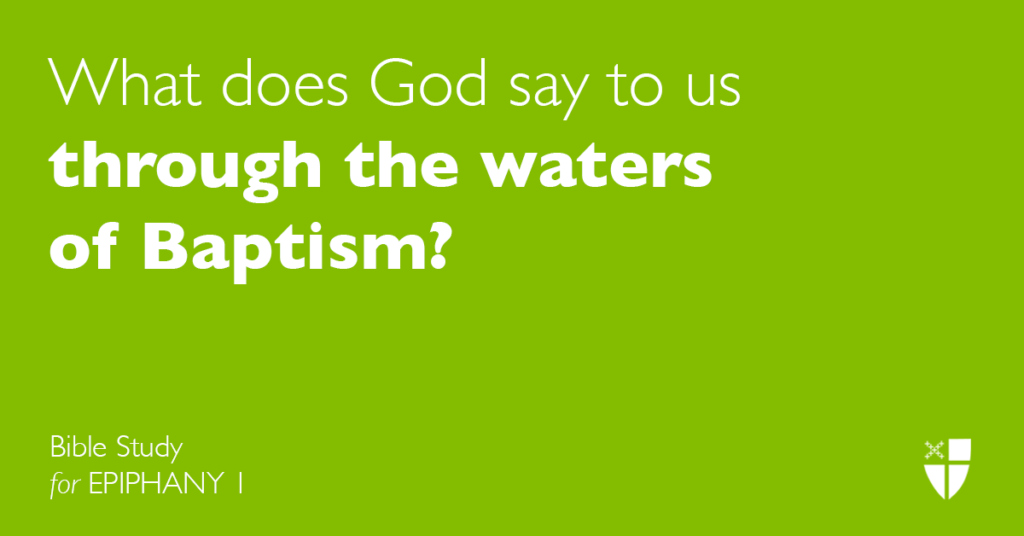This page is available in: Español
Bible Study: Epiphany 1 (C) – 2019
January 14, 2019

Isaiah 43:1-7
As we remember Jesus’ baptism in the River Jordan, the prophet Isaiah’s words speak to us about the profound faithfulness of God. In this passage, God promises his chosen people that he will be with them no matter what. During my undergraduate days at a small church-related college in the Midwest, we sang the hymn Great is Thy faithfulness constantly. My campus minister once pointed out to me why he liked it so much: “The song attributes faithfulness where it belongs—to God.” As Christians, we have a tendency to focus on our faithfulness, forgetting that it is God who is first and foremost faithful to us. Isaiah tells us that the Lord protects us. With God by our side, we can rest assured that no harm will come to us. “When you pass through the waters, I will be with you; and through the rivers, they shall not overwhelm you; when you walk through fire you shall not be burned, and the flame shall not consume you.”
- We often consider the importance of the promises that the candidates (or their sponsors) make at baptism, but what promises does God make to us in baptism? How does God’s relationship with Israel also represent these promises?
Psalm 29
This passage again focuses on the power of the Lord. Here it is the Lord’s voice that is characterized as especially powerful. The voice of the Lord can do just about anything! It breaks the cedar trees, splits flames of fire, shakes the wilderness, and makes the oak trees writhe. On this baptismal feast, Isaiah’s image of God’s voice on the waters puts one in mind of the spirit moving over the waters in creation, an image from Genesis which is echoed in the baptismal liturgy in the Book of Common Prayer. The psalmist says, “The voice of the Lord is upon the waters; the God of glory thunders; the Lord is upon the mighty waters.” The same voice of God that hovered over the deep before time began also gave strength to his people Israel, anointed his beloved Son at the Jordan, and is present with us now in the living waters of creation.
- Take a moment to read through the baptismal liturgy in the Prayer Book. How do we experience the voice of the Lord through this sacrament? What does God say to us through the waters of Baptism?
Acts 8:14-17
This passage from the Acts of the Apostles speaks of the ever-expanding body of Christ. Since the origin of the Church, baptism has meant inclusion in the Christian community. What we miss from this excerpt is that Philip has gone to Samaria to preach Jesus Christ, and he has evidently done so to great success, baptizing many along the way. When the apostles in Jerusalem hear of his success, they go to add their support and prayers for the new initiates. Putting aside complex theological arguments about the apostles’ role in bestowing the Holy Spirit, this story serves as a reminder of what baptism is really about: the Christian community. The newly baptized are part of a community that reaches far beyond the bounds of the local parish. Baptism is not a family rite of passage or a celebration of a little baby in a white dress. Just like our bishops today connect us to the wider church, Peter and John remind us that baptism is not about us, or our family, or even our parish. Baptism is about the entire community of Christ. Through it, God’s children are incorporated into an everlasting heritage dating back to the first apostles and stretching forward to eternity.
- Do you feel connected to the larger Body of Christ beyond your parish community?
- How does your baptism call you beyond the bounds of your congregation and into wider relationship with the people of God?
Luke 3:15-17, 21-22
The first three verses of this text take the hearer immediately back to Advent. On the Third Sunday of Advent in Year C, we hear these verses toward the end of the gospel reading. As John urges the people to “bear fruits worthy of repentance,” they begin to wonder if he might be the Messiah. No, he assures them, I baptize you with water, but he will baptize you with fire and the Spirit. Today we also hear Luke’s brief account of Jesus’ baptism. After Jesus’ baptism, the Holy Spirit is bestowed upon him by God: “The heaven was opened, and the Holy Spirit descended upon him in bodily form like a dove. And a voice came from heaven, ‘You are my Son, the Beloved; with you I am well pleased.’” The hearer gets the sense that this baptism—Jesus’ baptism—is different. This is not simply John’s baptism of repentance, this is God’s own son, specially anointed with the Spirit. Now that he has been identified by the very voice of God, his public ministry will begin to unfold.
- Just as Jesus’ baptism was the beginning of his public ministry, your baptism was the beginning of your life in Christ. What is the ministry of the baptized? How do you live into that ministry?
This page is available in: Español
Don’t forget to subscribe to the Sermons That Work podcast to hear this sermon and more on your favorite podcasting app! Recordings are released the Thursday before each liturgical date.
Receive Free Weekly Sermons That Work Resources!
This page is available in: Español


